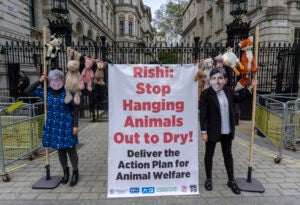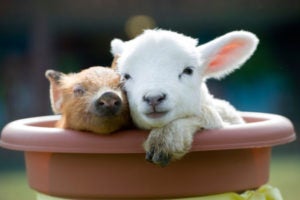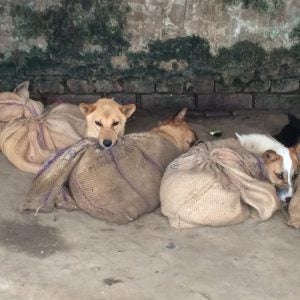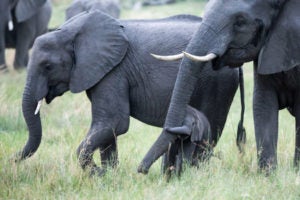
CAPE TOWN, South Africa—The Animal Law Project (ALP) proudly announces the release of its groundbreaking manifesto, “A Manifesto for Transforming Animal Protection in South Africa: A Constitutional Imperative” for public discussion, engagement and consultations. The Animal Law Project is a collaborative project initiated by Animal Law Reform South Africa (ALRSA), Humane Society International/Africa (HSI/Africa), (as well as the South African Institute for Advanced Constitutional, Public, Human Rights and International Law (SAIFAC), a centre of the University of Johannesburg) in 2022.
The Manifesto was developed after extensive consultations with the animal protection sector, other stakeholders including experts, veterinarians, academics, civil society organisations as well as discussions with government. It calls for an overhaul of the legal framework governing animals, most notably, reform of the outdated Animals Protection Act, which has remained largely unchanged for over 60 years, pre-dating South Africa’s constitutional democracy.
As South Africa celebrates 30 years of democracy, it is crucial to acknowledge that while strides have been made in pursuing social justice for humans, animals have largely been left behind. Despite expanding scientific consensus about non-human animal sentience (the ability to experience both positive and negative states of being), other extensive and complex animal capacities, and the weight of moral concern around animal suffering, it is arguably one of the worst times in history to be an animal. South Africa, known for its rich biodiversity, must now strive for social justice that includes all species.
In a landmark 2016 decision, the Constitutional Court of South Africa recognised animal welfare as a deep principle of the Constitution. The court acknowledged the sentience of animals and emphasized the intrinsic value of animals as individuals, shifting the focus from merely safeguarding human moral status to robust protection of animal welfare. Despite this recognition, there have been few changes to the administration of animal protection, leaving animals vulnerable to countless harmful and cruel practices.
Hundreds of millions of animals in various sectors endure ongoing and extreme suffering in South Africa:
- Over 1.1 billion land animals are produced and killed for food annually, with chickens making up the majority at over 950 million. The consumption of other animals such as cows, pigs, sheep, goats, rabbits, aquatic animals and even insects are also on the rise. Farmed animals often endure extensive harm, including close confinement, mutilation, forced pregnancies, and unnatural diets. Practices such as long-distance sea transport and mass killings during crises have exacerbated the situation.
- Wild animals are commodified as “faunal biological resources” under an interpretation of “sustainable use,” often resulting in their exploitation. Wildlife “farming”, often seen as a conservation success, prioritizes economic gains over true conservation. Harmful practices like canned hunting, poaching, and trophy hunting are prevalent, and both legal and illegal practices lead to the systemic killing of animals.
- Aquatic animals and invertebrates are often not recognised as animals, with their deaths being measured in tonnage rather than individually, and their suffering ignored entirely.
- Laboratory animals are subjected to inhumane testing, often for trivial or unnecessary purposes, such as the development of cosmetic products. The animal testing industry is characterised by inadequate regulation and oversight.
- Companion animals continue to suffer from homelessness, malnutrition, illness and abuse, with free-roaming populations facing unmanaged breeding and mass killings in shelters.
- Animals are also exploited in entertainment, tourism, and various economic activities, often suffering from neglect.
The previous Department of Agriculture, Land Reform, and Rural Development (DALRRD) has expressed the intention to draft a new Animal Welfare Bill. The ALP, initiated to address the gap that exist and to advocate for a just legal regime for animals in South Africa, by informing this legislative process with modern and constitutionally aligned animal protection proposals.
This newly released manifesto has drawn from stakeholder feedback from various sectors, including civil society organizations, human rights groups, the legal fraternity, environmental and conservation sectors, academics, veterinarians, and students.
The manifesto, available for public comment and feedback, consists of three parts:
- Part I: Introducing the background, impetus, and scope of the ALP, summarizing the extensive consultations, and the manifesto’s purpose.
- Part II: Providing a high-level problem statement, highlighting the deficiencies in current animal regulatory regime and institutions, reviewing international developments and introducing the concept of constitutional misalignment.
- Part III: Presenting tangible proposals for transforming animal protection in South Africa, detailing foundational values, guiding principles, and enabling mechanisms. The three foundational values proposed are constitutional alignment, sentience, and intrinsic value. The ten guiding principles include animal flourishing, vulnerability, ubuntu, public interest, least harm and proportionality, justifiability, duty of care, non-arbitrariness, knowledge, and internationality. The enabling mechanisms draw on existing South African and foreign precedent and best practice as well as commonly accepted tenets of good governance.
The ALP calls on the public, policymakers, and all stakeholders to engage with the manifesto and contribute to shape a future where the protection of animals is understood and realised as a matter of social justice and a constitutional imperative in South Africa.
Along with the launch of the manifesto, the ALP hosted a thought-provoking photographic exhibition in Cape Town and Johannesburg, featuring the work of renowned photojournalist Jo-Anne McArthur, alongside local artists from We Animals Media and South African activists. The exhibition, “Justice for Animals? The lived reality of animals in the 21st century” showcases the ongoing suffering of animals identified in the manifesto and aims to evoke a deeper understanding and empathy for the plight of animals.
ENDS
Media contacts:
- For more information about the report, Charan Saunders or Amy P Wilson at contact@animallawproject.org.za
- For media enquiries, Leozette Roode at LRoode@hsi.org and/or contact@animallawreform.org.za









